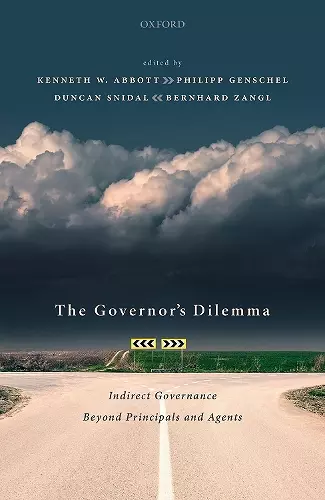The Governor's Dilemma
Indirect Governance Beyond Principals and Agents
Duncan Snidal editor Bernhard Zangl editor Kenneth W Abbott editor Philipp Genschel editor
Format:Hardback
Publisher:Oxford University Press
Published:11th Mar '20
Currently unavailable, and unfortunately no date known when it will be back
This hardback is available in another edition too:
- Paperback£35.49(9780198855064)

The Governor's Dilemma develops a general theory of indirect governance based on the tradeoff between governor control and intermediary competence; the empirical chapters apply that theory to a diverse range of cases encompassing both international relations and comparative politics. The theoretical framework paper starts from the observation that virtually all governance is indirect, carried out through intermediaries. But governors in indirect governance relationships face a dilemma: competent intermediaries gain power from the competencies they contribute, making them difficult to control, while efforts to control intermediary behavor limit important intermediary competencies, including expertise, credibility, and legitimacy. Thus, governors can obtain either high intermediary competence or strong control, but not both. This competence-control tradeoff is a common condition of indirect governance, whether governors are domestic or international, public or private, democratic or authoritarian; and whether governance addresses economic, security, or social issues. The empirical chapters analyze the operation and implications of the governor's dilemma in cases involving the governance of violence (e.g., secret police, support for foreign rebel groups, private security companies), the governance of markets (e.g., the Euro crisis, capital markets, EU regulation, the G20), and cross-cutting governance issues (colonial empires, "Trump's Dilemma"). Competence-control theory helps explain many features of governance that other theories cannot: why indirect governance is not limited to principal-agent delegation, but takes multiple forms; why governors create seemingly counter-productive intermediary relationships; and why indirect governance is frequently unstable over time.
Overall, this volume not only advances our theoretical understanding of modes of governance and governance dynamics by putting theoretical "meat" behind when to expect delegation, trusteeship, cooptation, or orchestration to occur but also puts its fingers on crucial political dynamics that occur across the globe that are rooted in the innovative insight that is the governor's dilemma. * Stephanie C. Hofmann, Graduate Institute of International and Development Studies *
The Governor's Dilemma successfully combines cuttingedge theory with deeply sourced empirical studies to inaugurate new avenues of research. It will be an indispensable resource for future studies of indirect governance,...The Governor's Dilemma deserves to be read widely in all corners of political science. * Orfeo Fioretos, Perspectives on Politics *
ISBN: 9780198855057
Dimensions: 240mm x 165mm x 23mm
Weight: 608g
314 pages